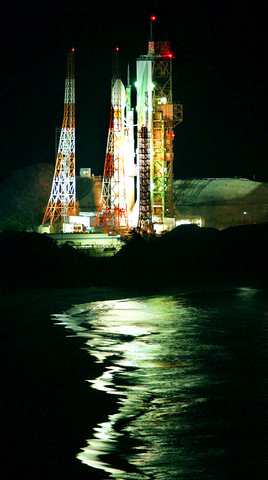Fifteen months after Japan's last liftoff ended in a spectacular fireball, an orange and white H-2A rocket blasted off yesterday on a mission officials hope will revive this country's once-proud space program -- now languishing in China's shadow.
The 53m tall rocket, with the word "Nippon," or Japan, emblazoned on its side, lifted off into a cloudy sky just before sunset from the sprawling space center on this remote southern island.

PHOTO: AP
The rocket carried a multipurpose weather and navigation satellite.
Japan's space agency, JAXA, was counting on a successful launch to help revive the reputation of the H-2A, which serves as the centerpiece of this country's space program, and to demonstrate that Japan remains a viable contender in an increasingly heated space race with China.
All H-2A launches had been put on hold following a humiliating failure minutes after liftoff from the main pad here in November 2003. Controllers had to detonate that rocket and its payload of two spy satellites in midair after a booster failed to detach.
The setback was all the more frustrating because it came just one month after China successfully launched its first astronaut into orbit. Beijing has since announced it is aiming for the moon.
Japan -- which in 1972 became the fourth country to launch a satellite and which has long seen itself as Asia's leading spacefaring nation -- has no manned space program of its own. Aware of the Chinese challenge, a government panel last year recommended that Japan begin studying the possibility of sending astronauts into space.
In the meantime, officials have stressed that the H-2A, which was designed and built in Japan, has a relatively good -- if not perfect -- record.
The 2003 failure came after five-straight successes, giving it an 83 percent success rate. Europe's Arianne V and China's Long March III both have about an 85 percent rate.
Even so, Japanese hopes that the H-2A would become an attractive competitor in the commercial launching business have yet to pan out because of the rocket's high cost and infrequent liftoffs.
JAXA officials stress that because Japan's space program, which has a budget of about ?260 billion (US$2.5 billion), is strictly non-military, it can afford only one or two launches a year.
They say that is the main reason why Japan -- despite being Asia's richest and most technologically advanced nation -- is falling behind China.
But the nature of Japan's space program is changing.
The perceived threat from communist neighbor North Korea, which launched a Taepodong 1 missile over Japan's main island in 1998, has provided a strong impetus for Tokyo to beef up its space capabilities.

PRECARIOUS RELATIONS: Commentators in Saudi Arabia accuse the UAE of growing too bold, backing forces at odds with Saudi interests in various conflicts A Saudi Arabian media campaign targeting the United Arab Emirates (UAE) has deepened the Gulf’s worst row in years, stoking fears of a damaging fall-out in the financial heart of the Middle East. Fiery accusations of rights abuses and betrayal have circulated for weeks in state-run and social media after a brief conflict in Yemen, where Saudi airstrikes quelled an offensive by UAE-backed separatists. The United Arab Emirates is “investing in chaos and supporting secessionists” from Libya to Yemen and the Horn of Africa, Saudi Arabia’s al-Ekhbariya TV charged in a report this week. Such invective has been unheard of

‘TERRORIST ATTACK’: The convoy of Brigadier General Hamdi Shukri resulted in the ‘martyrdom of five of our armed forces,’ the Presidential Leadership Council said A blast targeting the convoy of a Saudi Arabian-backed armed group killed five in Yemen’s southern city of Aden and injured the commander of the government-allied unit, officials said on Wednesday. “The treacherous terrorist attack targeting the convoy of Brigadier General Hamdi Shukri, commander of the Second Giants Brigade, resulted in the martyrdom of five of our armed forces heroes and the injury of three others,” Yemen’s Saudi Arabia-backed Presidential Leadership Council said in a statement published by Yemeni news agency Saba. A security source told reporters that a car bomb on the side of the road in the Ja’awla area in

US President Donald Trump on Saturday warned Canada that if it concludes a trade deal with China, he would impose a 100 percent tariff on all goods coming over the border. Relations between the US and its northern neighbor have been rocky since Trump returned to the White House a year ago, with spats over trade and Canadian Prime Minister Mark Carney decrying a “rupture” in the US-led global order. During a visit to Beijing earlier this month, Carney hailed a “new strategic partnership” with China that resulted in a “preliminary, but landmark trade agreement” to reduce tariffs — but

SCAM CLAMPDOWN: About 130 South Korean scam suspects have been sent home since October last year, and 60 more are still waiting for repatriation Dozens of South Koreans allegedly involved in online scams in Cambodia were yesterday returned to South Korea to face investigations in what was the largest group repatriation of Korean criminal suspects from abroad. The 73 South Korean suspects allegedly scammed fellow Koreans out of 48.6 billion won (US$33 million), South Korea said. Upon arrival in South Korea’s Incheon International Airport aboard a chartered plane, the suspects — 65 men and eight women — were sent to police stations. Local TV footage showed the suspects, in handcuffs and wearing masks, being escorted by police officers and boarding buses. They were among about 260 South